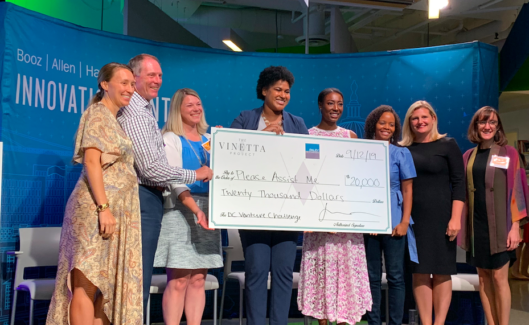
This guest post is a part of Racial Equity Month of Technical.ly's editorial calendar.
Editor’s note: This guest post is adapted from an email Vinetta Project DC Director Dawn Myers sent to Technical.ly responding to a request for comment. It is reprinted here with permission and appears as part of a series of short guest posts from local leaders on how they are addressing the issue of systemic racism with their organizations.
Recent uprisings all across our nation have shined the light of urgency on deep historical divides that have left Black and Brown communities crushed by the confluence of economic and health insecurity in recent months. That compounded with generations of systemic racism, especially with respect to law enforcement, has created a tinderbox whose caustic contents are spilling out into the streets in cities across the country.
These events have touched all parts of our society, including the tech and venture community, and it’s important that those dots are connected clearly and explicitly by authorities in the space.
The tech industry is a powerful force for change, and we can no longer ignore the pleas of Black and other underrepresented groups for support. It’s time to act swiftly and without hesitation. My organization, The Vinetta Project, will continue discussing a comprehensive response in the days to come. We will be using this moment to take inventory of our place in the local community and tech ecosystem, dissect what we’re doing well with respect to intersectionality in the diversity space, as well as what we can do better.
My advice to other organizations is as follows:
- Have a frank conversation with your staff. Acknowledge and make space for the stress and pressure they may be under. Set up a conference call or a virtual meeting specifically to address current events rather than sending an email. This sets the tone for your organization and shows that leadership takes these issues seriously. Also, make it clear that your staff is welcomed to contact leadership in private to discuss their limitations during this time and that every effort will be made to provide reasonable accommodations.
- Make a clear statement that will be visible to and resonant with your audience. Black and Brown people and their allies are hurting and they are looking and listening for organizations to make their position unequivocal.
- Let your staff and audience know that you are working on or executing a plan to ensure your organization’s long-term commitment to substantive, intersectional equity. While we can’t be expected to have the answers overnight, it is important for your audience to have confidence in your organization’s stance and direction.
- Going forward, hold your company accountable. Set measurable goals and report on them. Those goals may be different depending on your organization’s mission — a VC firm may commit to a certain number of investments in companies based in distressed communities; accelerators may commit to a funded program exclusively for underrepresented founders — but follow through is critical. It’s more important than ever to do more than simply espouse talking points.
- Most pressingly, as Bryce Roberts of O’Reilly AlphaTech Ventures implores, make the hire and write the check. If you don’t know the abysmal statistics, you can read about them here and here. Underrepresented founders — and Black women in particular — are all but barred from the tech landscape through bias and exclusion. Lack of quality deal flow is not an excuse. There are a number of pipeline organizations you can contact to source vetted deal flow, including The Vinetta Project, Black Girl Ventures, 1863 Ventures, Backstage Capital, and a myriad of others doing substantive equity work in the space. Lack of quality candidates is not an excuse. Organizations such as Score 3 Ventures have created a pipeline of well trained and credentialed Black candidates ready for hire in venture.
Investment in Black and Brown founders contributes directly to the economic viability of Black families and communities, and it’s time to put our money where our morals are. To be clear, this isn’t just about doing the right or charitable thing; this about good business. New majority consumers are growing in number and economic leverage by the year. The spoils of the next quarter century will go to the companies that figure out how to appeal to the needs of communities so often ignored by the market. Organizations that fail to lean in are not only on the wrong side of history, they are leaving money on the table.
Also, Black Lives Matter.
Join the conversation!
Find news, events, jobs and people who share your interests on Technical.ly's open community Slack

DC daily roundup: Esports at Maryland rec center; High schoolers' brain algorithm; Power data centers with coal?

DC daily roundup: Tyto Athene's cross-DMV deal; Spirit owner sells to Accenture; meet 2GI's new cohort

DC daily roundup: $10M to streamline govt. contracting; life sciences might dethrone software; Acadia's new $50M


